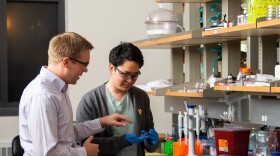-
National news outlets have been reporting on a condition known as "scromiting." It's an intense combination of screaming and vomiting that’s brought on by overindulgence in cannabis. We talked with a doctor at Children’s Hospital Colorado who says the condition is real, although the ‘screaming’ part is a bit exaggerated.
-
Depression and other mood disorders may have side benefits – like creativity and empathy. Here’s whyLife with bipolar disorder or chronic depression can come with intense periods of sadness or despair. But these conditions might also come with some surprising advantages – including better social relationships and creative abilities. That’s according to new research from the University of Colorado. We dig into the possible “silver linings” of mood disorders.
-
While mental health has improved across the state, more than one in five Coloradans say they are lonely. That is according to a new survey of ten thousand households, published by the Colorado Health Institute.
-
Hispanics and Latinos are disproportionately impacted by HIV in the U.S. A researcher at the University of Colorado College of Nursing conducted a study that created a telenovela, which provides information and strategies to help people manage the disease.
-
Bladder cancer affects thousands of people in the U.S. each year – and it’s difficult to treat. But scientists at CU Boulder may have found an innovative way to deliver chemotherapy to patients with bladder cancer. It’s inspired by the gripping power of gecko feet.
-
More than a dozen Democrat-led states found a coalition to share public health data, best practices, and more.
-
If you had pets growing up, your body might be better equipped to respond to stress as a result. A new study out of the University of Colorado shows that pets help our immune systems by exposing them to helpful microbes. And those microbes reduce inflammation caused by stress.
-
Colorado is seeing a late summer surge of COVID-19 as a new variant of the virus has emerged. It's an offshoot of Omicron.
-
Bladder cancer affects thousands of people in the U.S. each year – and it’s difficult to treat. But scientists at CU Boulder may have found an innovative way to deliver chemotherapy to patients with bladder cancer. It’s inspired by the gripping power of gecko feet. We explore how the tiny lizards may have inspired a better form of cancer treatment.
-
Recently retired Colorado scientist Lisa McKenzie chased the link between fracking and adverse birth outcomes, cancer and cardiovascular disease.

Play Live Radio
Next Up:
0:00
0:00
Available On Air Stations









